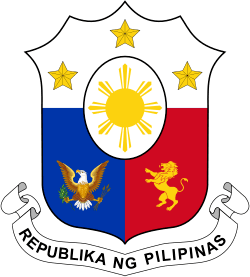Purok
 |
|---|
| This article is part of a series on the politics and government of the Philippines |
|
Constitutional commissions |
Purok (English: District[1]), also known as zone, is a political subdivision of a barangay.[2] It is the smallest unit of governance in the Philippines[3] led by an appointed barangay councilor.[4] It is not, however, officially considered a local government unit. The barangay is the smallest political unit officially.[5]
A purok is typically composed of twenty to fifty or more households, depending on the particular geographical location and cluster of houses. If created and given a mandate by an ordinance of the barangay, municipality, or city, a purok could perform government functions under the coordination and supervision of their local officials.[3]
See also
References
- ↑ Santos, Arceli (2006). Vicassan's Pilipino-English Dictionary (Abridged Edition). Pasig City, Philippines: Anvil Publishing Inc. p. 524. ISBN 971-27-1707-0.
- ↑ Guillermo, Artemio R. & Win, May Kyi (2005). Historical Dictionary of the Philippines (2nd ed.). Lanham, Maryland, United States of America: Scarecrow Press, Inc. p. 328. ISBN 978-0-8108-5490-1.
- 1 2 "Purok system mobilizes community, improves governance". Ramon Aboitiz Foundation Inc. May 7, 2012. Retrieved 14 November 2012.
- ↑ Alkuino, Xerxes (August 7, 2012). "LGUs urged to put up purok system". Cebu Provincial Government. Retrieved 5 May 2014.
- ↑ "Philippine Standard Geographic Code (PSGC) - Concepts and Definitions - Local Government Units". nap.psa.gov.ph. Philippine Statistics Authority. Retrieved 2018-08-07.
This article is issued from
Wikipedia.
The text is licensed under Creative Commons - Attribution - Sharealike.
Additional terms may apply for the media files.